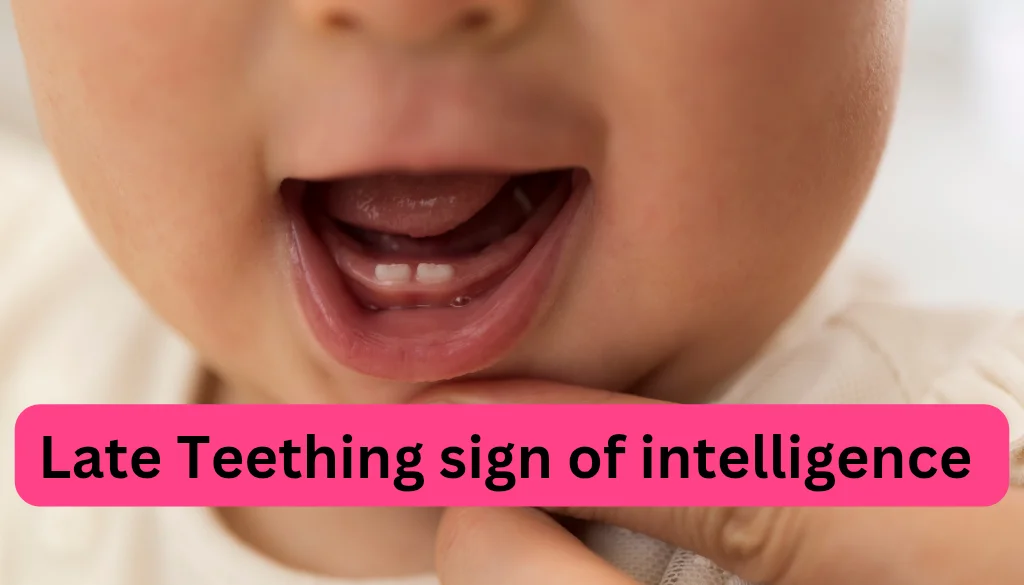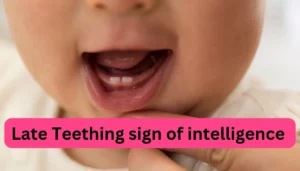Is your child’s teething process delayed, and you wondering late teething sign of intelligence in babies? Don’t worry, as a mother, I can understand your situation well. That’s why I’ve written this blog post to answer all your questions and solve problems related to the delayed teething of your child.
Many parents relate delayed teething with their child’s intelligence and consider it a sign of their child’s intelligence. How true is this belief? In today’s article, we will explore the notions that link delayed teething with intelligence.
We will also discuss the typical timelines for teething, delve into the underlying reasons for delayed teething, and examine whether science supports the idea that late teething signifies a child’s brilliance.

Contents
- 1 Late Teething Sign of Intelligence in Children?
- 2 Benefits of late teething
- 3 Is Delayed Teething a Sign of Intelligence? Let’s explore the connection between them.
- 4 Late teething sign of autism
- 5 What Late Teething Could Actually Be a Sign of
- 6 When to Consult a Doctor?
- 7 Conclusion On Is Late Teething Sign of Intelligence
- 8 Related FAQs of Is Late Teething Really a Sign of Intelligence?
Late Teething Sign of Intelligence in Children?
The timing of teething varies among all children. Some children’s teeth come in early, while others take more time. This has led many people to believe, based on their cultural beliefs, that late teething is a sign of intelligence.
Researchers have studied this late teeth notion, but there is no solid evidence to prove it. So that today, we will provide an in-depth explanation and answer other questions related to late teething. So, let’s find out whether delayed teething is a sign of intelligence.
What is the typical age for the first tooth?
As anxious parents waiting for that first tooth to pop through, it’s normal to wonder – when can we expect those first pearly whites to make their debut? Well, there’s a pretty wide range for when babies get their first tooth. Most sprout their inaugural tooth sometime between 4 and 7 months of age.
According to the American Academy of Pediatrics,(AAP), 6 months is the average age for a baby’s first tooth to emerge. But it’s still considered totally normal and healthy for teething to start a little earlier, say around 3 or 4 months, or later, closer to their first birthday.
Those first teeth to arrive on the scene are usually the lower central incisors, the two bottom front teeth. And they typically come through in pairs, so you’ll notice two teeth at once during that exciting first teething milestone! Once the lower incisors break through, upper incisors and first molars often follow soon after.
So remember, every baby develops at their own pace when it comes to teething as with other milestones. While 6 months is the standard, anytime from 4 to 7 months, or even up to a year falls within the normal range for getting those first pearly whites. If you have any concerns about your baby’s teething timeline, chat with your pediatrician. But in most cases, there’s no need to worry – their smile will light up your world when the time is right!
What are the signs of teething?
Teething can be an uncomfortable process for babies as those new teeth push up through the gums. But how do you know when your little one is working on getting those pearly whites? There are some common signs to tip you off that teething is underway:
- Extra drooling and wetness around the mouth – All that swelling and irritation in the gums gets babies producing more spit!
- Chewing and gnawing on hands, toys, etc. – The pressure on the gums feels good and massages those incoming teeth.
- Fussiness and trouble sleeping – The discomfort of teething can disrupt regular naptimes and nighttime.
- Swollen, inflamed gums – The gums will look red, tender, and inflated right before new teeth emerge.
- Biting and nursing issues – Older babies may clamp down more when nursing as teething begins.
- Rash around the mouth – Lots of drool can lead to irritation, chin rashes, and facial redness.
- Refusal to eat – Appetite changes are common as teething impacts feeding.
If you notice a combination of these symptoms but don’t see any new teeth yet, teething is likely right around the corner! The fussiness and disrupted sleep patterns usually peak right as the tooth is about to cut through the gum. But once you spot that new white tip poking through, the hardest part is over!
Causes & Reasons for late teething in babies
If those first teeth are taking their sweet time showing up, you may wonder – why is my baby getting a late start on teething? There are a few factors that can contribute to delayed teething:
- Genetics – Late teething tends to run in families. If you or your partner were late teethers, chances are your little one will follow suit.
- Nutritional deficits – Shortages of key minerals like calcium and vitamin D can impact dental development and delay teething.
- Physical delays – Late teething sometimes signals generally slower physical maturation in babies.
- Medical conditions – Some congenital disorders like Down syndrome are associated with later teething.
- Low birth weight – Preemies or smaller babies often experience delayed teething.
- Illness – Serious childhood illnesses and medical treatments can disrupt the teething timeline.
The good news is that in most cases, late teething is just a result of hereditary factors or normal variation in development. As long as your pediatrician confirms your baby is growing and hitting other milestones on track, late eruption likely doesn’t indicate any underlying problems. Try to be patient, provide plenty of chewing practice, and those pearly whites will arrive before you know it!
Syndromes with delayed eruption of teeth
In some cases, late teething can be associated with certain genetic conditions or syndromes that impact dental development. A few examples include:
- Down syndrome – Delayed teething is very common in babies with Down syndrome. Those first teeth sometimes don’t pop through until age 2 or later.
- Congenital hypothyroidism – When the thyroid gland doesn’t function properly from birth, it can delay teething and cause teeth to come in later.
- Cleidocranial dysplasia – This condition affecting collarbone and skull development often causes teeth to be significantly delayed, sometimes emerging as late as age 2-3.
- Rieger syndrome – A rare disorder involving eyes, facial features, and teeth. It’s associated with the late eruption of teeth.
The good news is that even if late teething is linked to one of these syndromes, dentists can help manage symptoms and support your child’s dental development. With proper treatment and care, their pearly whites will come in beautifully in their own time.
Benefits of late teething
While delayed teething can be stressful waiting for that first tooth, there are some Benefits of late teething in babies:
- Reduced risk of early infant ear infections which can occur when new teeth cut through the gums
- More time for jaw muscles and oral structures to mature before teeth erupt
- An extended window for easier breastfeeding without biting issues
- Delayed teething may lead to better oral health habits from the start
So even though it means waiting longer for your baby’s first tooth, late eruption can be beneficial in many ways!
Is Delayed Teething a Sign of Intelligence? Let’s explore the connection between them.
As parents, of course, we wonder – could my baby’s late teething mean they’re intelligent? While it’s an intriguing idea, science doesn’t back up a clear link between late teething timing and intelligence. But there are some interesting theories:
- Late physical development like teething may allow more focus on cognitive growth early on.
- Late teething can correlate with conditions like autism that involve higher intelligence.
- Syndromes causing intellectual disability tend to have early teething.
However, experts say not to read too much into eruption patterns. Late and early teethers both display the full range of cognitive abilities. Teething likely has little bearing on giftedness or IQ.
Late teething sign of autism
Late teething is more common in autistic children, but on its own is not necessarily an early red flag for autism spectrum disorder. Here’s what we know:
- Disruptions in immune function and oral sensitivities in autism can delay teething.
- Autism impacts development across domains, including physical milestones.
- Late teething and autism may both involve genetic factors.
So while late eruption and ASD do correlate, other social and behavioral symptoms would also be present. If you have other concerns about autism, do bring up late teething to your pediatrician.
What Late Teething Could Actually Be a Sign of
While intelligence likely isn’t a factor, late teething can point to:
- Overall slower physical development – babies may be late sitters, walkers, etc.
- Nutritional shortcomings – lack of sufficient vitamins and minerals
- Genetic conditions – syndromes like Down syndrome that affect teething
- Structural facial issues – small jaw, cleft palate can obstruct teeth
- Birth complications – prematurity, low birth weight, birth defects
So while being a sign of giftedness is unlikely, late eruption can give clues about other health and developmental factors to be aware of.
When to Consult a Doctor?
See your pediatrician if your baby has:
- No teeth erupted by 12-14 months of age
- Signs of oral infections, swelling, or lesions
- Delayed growth and other deficiency symptoms
- Missed milestones in other areas like movement
- Known family history of genetic disorders
Your pediatrician can help identify any issues that may be contributing to severely delayed teething. In most cases, no treatment is needed and it’s just a variation of normal. But identifying any problems early allows for earlier intervention.
Conclusion On Is Late Teething Sign of Intelligence
While we’d love to believe our baby’s late teether is showing signs of genius potential, the evidence doesn’t indicate late teething is a sign of intelligence. Timing of physical milestones doesn’t necessarily reflect cognitive skills. Focus less on teething patterns as markers of giftedness, and more on supporting your baby’s development across all areas.
If you have concerns about late teething, discuss them with your pediatrician. But in most cases, it’s just normal variation in the teething process. With the proper care, your little one will continue growing into their full potential!
Read Also: Is Lining Up Toys A Sign Of Intelligence?
Related FAQs of Is Late Teething Really a Sign of Intelligence?
Why is my baby teething late?
Genetics, nutritional deficiencies, and medical conditions are some common reasons babies may start teething later. If your baby is developing well otherwise, late eruption is likely just normal variation in timing and nothing to be concerned about.
What stage of teething hurts the most?
The most painful and fussy stages of teething are typically right before the tooth cuts through the gums and when the molars start coming in around 1-2 years old. Discomfort seems to peak right as the new tooth is about to emerge.
How much delay in teething is normal?
Up to about 6 months delay from the average 6 month timeline is considered within the normal range of variation for getting the first tooth. Consult your doctor if no teeth have broken through by 12-14 months of age.
What are the syndromes with delayed eruption of teeth?
Down syndrome, congenital hypothyroidism, cleidocranial dysplasia, and Rieger syndrome are examples of genetic disorders associated with later teething, sometimes erupting teeth as late as 2-3 years old.
How can I make my baby teeth come in faster?
While you can’t force teeth to erupt sooner, gently massaging swollen gums, using cold teething rings, and trying over-the-counter numbing gels can provide symptom relief as you wait for those pearly whites.

